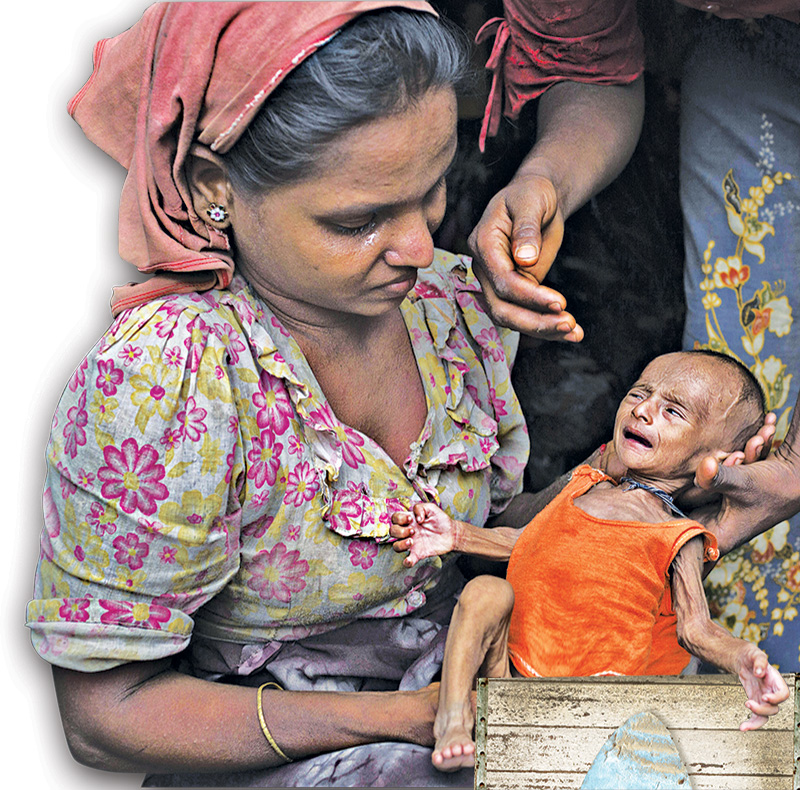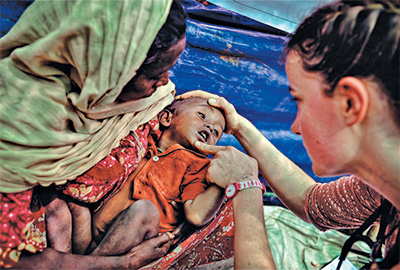Bigotry: The Dark Danger
Beautiful Rohingyas

DOWNLOAD THE BOOK
CHAPTERS OF THE BOOK
- Introduction - When the Migration Wave Starts to Wash Ashore
- Chapter 01 - Open Letter to the Burmese (Myanmar) Administration
- Chapter 02 - Events in Myanmar Are Crime Against Humanity
- Chapter 03 - A Cry for Help to the U.N. from Rohingya of Myanmar
- Chapter 04 - Behind the Persecution in Myanmar
- Chapter 05 - Myanmar Should Beware of Radicalism
- Chapter 06 - Deafening Silence over Rohingya Issue
- Chapter 07 - Rohingya People Ignored by Myanmar Government
- Chapter 08 - Why Does the World Turn a Blind Eye on Children's Cries Coming from a Far Corner in Southeast Asia?
- Chapter 09 - Are the Rohingyas Doomed to Remain Stateless?
- Chapter 10 - The Rohingya Muslims Are Being Exiled in Their Own Lands
- Chapter 11 - Differences Can Become Richness
- Chapter 12 - What If You Didn't Have Even an Inch of Land to Live on in This World?
- Chapter 13 - Not the Rohingya Crisis, but a Crisis of Humanity
- Chapter 14 - Are the People of Rakhine Condemned to Be Oppressed in the Countries to Which They Flee?
- Chapter 15 - Being a Muslim Woman in Myanmar
- Chapter 16 - How Does It Feel to Be a Rohingya?
- Chapter 17 - Small Steps That Could Make a Big Difference
- Chapter 18 - The Only Solution to the Refugee Crisis That Shook the World
- Chapter 19 - Rohingyas' Uncertain Fate Post-Polls
- Chapter 20 - Time for Global Community to Step up for Myanmar's Muslims
- Chapter 21 - Humans Have Rights on Paper, but Apparently Not in Real Life
- Chapter 22 - The Forgotten Rohingya
- Conclusion - Unity among Muslims Is the Most Vital Issue
< <
17 / total: 24
Chapter 16 - How Does It Feel to Be a Rohingya?This article was published on Burma Times on April 15th, 2014 Since 2012, a place called Arakan in Myanmar has been grabbing international headlines, with reports of people being hunted down and killed, villages being put to the torch, and refugees being stranded at sea after neighboring countries refused to let them in. So what's going on in Myanmar?The Rohingya Muslims are a minority in Myanmar that once ruled the region with a kingdom that lasted for 350 years. Later, the tide turned and the Rohingya became a minority in their own homeland. Today, they are known as the most persecuted people in the world, stateless and seemingly unwanted by anyone. If you are a Rohingya you have two choices:
◉ 1) You can stay at home. But that means being forced to live in dismal camps with no freedom to leave, frequent attacks by extremist mobs, which includes being burned to death, and your house being burned down. Also you will be denied citizenship rights and you cannot rely on the security forces, as what happened until now make it clear. From 1942 to 1996, two million people were forced to flee their homes, 15,000 settlements were razed to ground, 300,000 people were slaughtered and 20,000 women were raped. 5,000 mosques were destroyed and in 2012, the attacks flared up with 330 villages burned down with their residents in them. Moreover, if you choose to stay, you cannot go to state hospitals, own a motor vehicle or even a telephone. If your house, which by the way can only be wooden, burns down by mistake, you will face up to six years in prison.
◉ 2) Migrate somewhere else. But go where? Bangladesh, although itself a Muslim country, chooses to close its doors in the faces of these traumatized people crammed onto makeshift boats, leaves them stranded in the ocean and most of the time, those boats sink with everyone onboard. What are the other options? Go to Thailand, and if they accept you (though unlikely), risk being captured by human traffickers and sold as slaves (Reuters recently uncovered a massive human trafficking scheme that involved Thai immigration officers.) However, most of the time Thailand doesn't accept these people and leaves them stranded at sea. There is even footage of people being handcuffed and pushed into the sea from behind by Thai officials. Malaysia graciously offers a home to these poor people, but it is a distant land to reach with such unreliable boats. The USA has recently offered shelter to some and although the act is highly laudable, the numbers are incredibly low and therefore far from being a real solution to the ordeal of the world's most persecuted people. As hard as it is to believe, these painful incidents are happening as you read these words, or as you watch your favorite TV show. Most recently, Doctors Without Borders were banned from working in the country as they were accused of favoring the Rohingya; sadly, DwB were the only medical treatment the Rohingya Muslims could obtain. Again, recently Du Chee Yar Tan village was the scene of fresh attacks by Myanmar security officials and radical Buddhists. The village was closed off, but five Muslim men snuck into the area to find the severed heads of at least 10 Rohingya in a water tank and some of those were children. Extremist Buddhist groups on the other hand continue to spread hatred of Muslims, by traveling the countryside with motorbikes. These are actual human beings and just because they are living in a remote part of the world, or simply because they are from a different religion, does not change the fact that these are innocent civilians. They are not statistics; they are someone's mother, father, husband, child, or wife. Yet, they face isolation and are left to deal with their pain alone. So what can be done to put an end to these horrible scenes?First of all, the Myanmar government and the Buddhist majority must overcome their irrational fear of being taken over by Muslims. The abhorrent human rights violations of the Rohingya should be immediately stopped and they should be treated as human beings. It is known that Buddhists are peaceful people by nature. A national campaign targeting both sides, appealing to their Islamic and Buddhist background, as both are based on principles of love and forgiveness, can help overcome the resentment. A country-wide intellectual campaign, educating people about the peaceful moral values of Muslims, how the true Islam preaches love and compassion for all, and how the different ethnical groups can harmoniously co-exist with examples from the past could help move on to a more peaceful stage for the country. The UN, the EU and the USA and others keep issuing statements explaining how concerned they are with the situation, but it is obviously not enough. And more importantly, Muslim countries should put an end to their embarrassing silence and attitude of general indifference. Without further ado, they should come together, form an alliance and union of love, cooperation and peace to help and defend the rights of the oppressed, wherever or whoever they might be. No economic concern, material interest or past hostility can be more important than the opportunity to help people in need.
|
17 / total 24
You can read Harun Yahya's book Beautiful Rohingyas online, share it on social networks such as Facebook and Twitter, download it to your computer, use it in your homework and theses, and publish, copy or reproduce it on your own web sites or blogs without paying any copyright fee, so long as you acknowledge this site as the reference.

